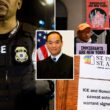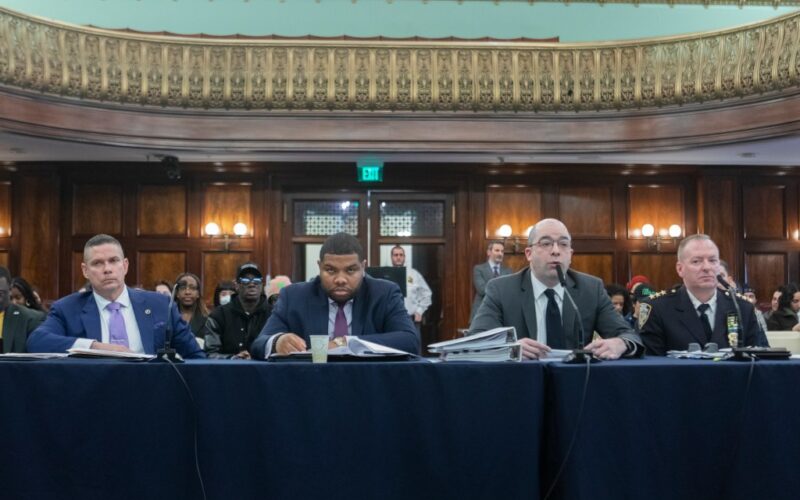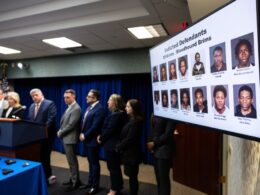For three hours on Monday, the NYPD’s top lawyer and police brass dueled members of the City Council over bills to eliminate a gang database and bar DNA tests of teens without parental consent.
Neither side seemed to budge.
Michael Gerber, the deputy commissioner for legal matters, and police brass labored to convince the Council’s Public Safety Committee of the necessity for the database, arguing it is now smaller with more controls in place.
Gerber said there were more than 18,000 names in the database in 2019. Now there are about 13,000 — a 27% decline. The number of teens in the database in 2019 totaled 440 while there are now just 160, he said.
“It would be a terrible mistake to take this important public safety tool away from the department,” he said.
rikers
Barry Williams for New York Daily News FILE – New York City Council member Antonio Reynoso (far right) speaks at a rally announcing a bill to eliminate the NYPD’s gang database, Sept. 15, 2021. (Barry Williams for New York Daily News)
He cautioned if the database is eliminated, people will still be identified as linked to gangs, but it will happen “informally” without controls in place.
The Council backers of the bill and critics noted the database is made up almost entirely of Black and Hispanic New Yorkers and names stay in the database far longer than they should.
“Today’s legislation is a small step the NYPD can take in righting the wrongs of many years rather than oppressing communities,” said Council Member Althea Stevens (D-Bronx), a sponsor of the bill.

Public Advocate Jumaane Williams said the database was “not the best use of police resources.” The implication of being added to the database, he said, “is almost impossible to refute.”
Stevens suggested the database amounted to racial profiling.
“It is not racial profiling; that is very unfair,” Gerber replied, as someone in the audience laughed loudly. “The data I gave was about individuals arrested for shootings and shooting victims. There is nothing racial profiling about that.”
“I want the number on what percentage of shootings this has stopped,” Stevens countered with Gerber replying it would be difficult to come up with such a number.
Joann Ariola, a Republican Council member, called the gang database bill “Insanity that would cause chaos in this city.”

The DNA bill would bar the department from collecting the DNA of teenagers without consent from a parent, guardian or lawyer. The department has been criticized for using surreptitious means to collect DNA, like grabbing a soda can used by a suspect after questioning.
Gerber said the department does not object to the bill, except that he asked for an exception for serious violent felonies only if approved by the chief of detectives.
“It’s so rare that we collect these samples from juveniles and it’s only from tremendously serious crimes,” said Assistant Chief Jason Savino.
But Council Member Tiffany Caban said she opposed the exception.
“Their Constitutional rights should be protected. They are not of the right mindset to give consent,” she said.








